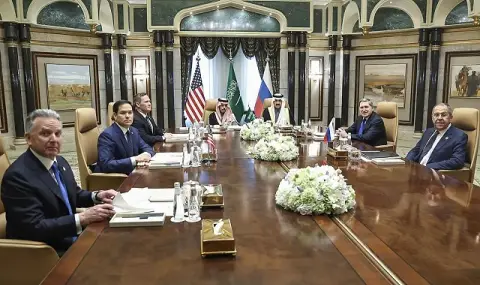President Trump is ready to make significant concessions to Putin. Europe is in shock. The summit between the US and Russia in Riyadh could dramatically change the geopolitical balance in the world, writes Dirk Emmerich for DW.
In 2023, Hans-Ulrich Jörges and Axel Formbeuymen published a book in which they describe the world in 2025: Donald Trump, who is once again US president, meets in Cairo with Vladimir Putin and announces that America will withdraw its troops from Europe and leave NATO. In return, Putin unties his hands for actions against China. The two major nuclear powers are once again dividing the world and turning their backs on organizations and alliances that stand in their way. The “Big Two” (Trump and Putin) are deciding things their own way.
Is the world governed by the right of the strong?
What sounded like a plot from a political thriller two years ago is now close to reality. True, the US is (still) in NATO, Trump and Putin are meeting not in Cairo but in Riyadh - but everything else is true. The world is no longer governed by the right of the strong, but by the right of the strongest.
The United States is currently changing the coordinate system of the global world order at an incredible speed. Europe is in a state of shock, but it is hard to imagine that at emergency meetings like the one in Paris, European leaders could quickly find an answer other than a call to uphold common Western values.
The most important political axis in the EU between Berlin and Paris has not been functioning optimally for a long time. French President Emmanuel Macron and German Chancellor Olaf Scholz have never found a common language. Moreover, the Social Democrat Scholz will only be at the head of the German government for a few more days - after the early elections for the Bundestag on February 23, the leader of the conservative Christian Democratic Union (CDU) Friedrich Merz will probably take his place.
Putin has already won?
The results of the Riyadh summit could look like this: the US negotiates a framework agreement with Russia and washes its hands of it. Kiev is not at the negotiating table, but sits on the sidelines. Europe is not present at all. As soon as the agreement is concluded, the US leaves the stage, and Europe must do the rest.
And Trump behaves with Putin in such a way that he can hardly believe his luck. The conquered Ukrainian territories go to Russia, and Ukraine's membership in NATO falls off the agenda. These were precisely Putin's preconditions for starting negotiations, and now they are part of the invitation to dialogue sent to him by the American president.
Furthermore, Trump does not want to deploy American troops in Ukraine and intends to return Russia to the G-8. Trump and Putin agreed on all this, communicating as equals. Putin has always wanted exactly this - to be treated equally, which he himself hardly considered possible. And another of Putin's calculations is coming to light: he has always sought to drive a wedge into the Western alliance, and now he gets it for free. America and Europe are no longer united.
A bad scenario for Ukraine
If all this really happens at the US-Russia summit in Riyadh, it will be an absolute victory for Putin and a loss for the West. Ukraine has always feared this worst-case scenario for it, and experts and think tanks in Europe have repeatedly warned of such a dangerous development. The approach of the hurricane could have been foreseen, because Trump has never hidden exactly what he intends to do. But Europe was simply trying to push away such thoughts - and now it has found itself exposed.
A reliable peacekeeping force will be needed - from 140,000 to 150,000 soldiers - to ensure that the ceasefire in Ukraine is observed. But reliable, note, and not UN blue helmets who will simply patrol. The majority of the peacekeeping force will probably have to come from Germany, but neither the Bundeswehr nor German society is prepared for this in any way.
Vance's speech shook Europe to its core
As if all that weren't enough, US Vice President J.D. Vance dealt another blow to Europe at the Munich Security Conference. When Vance took the podium, everyone expected him to announce details of a ceasefire plan for Ukraine. But the vice president's speech exceeded even the worst expectations - it was an 18-minute speech that shook Europe to its core.
Vance sees the greatest danger to Europe not in Russia or China, but in the “threat from within“. Governments, he said, are afraid of their voters and are turning certain parties into pariahs. In this case, the American was referring to the far-right “Alternative for Germany“ (AfD). He then met with the leader of this party, Alice Weidel, but not with Federal Chancellor Olaf Scholz. At the same time, President Trump was speaking - across the ocean - about the greatness of the American and Russian people. Which is completely new: America speaks of its enemies as old friends. And of its old friends - as enemies.
At the Munich Security Conference, it became clear that something in transatlantic relations had broken down. Ukrainian President Volodymyr Zelensky put it succinctly: “From now on, everything will be different“. One might have thought that someone from the American delegation in Munich had said it.
*Dirk Emmerich is a correspondent for the German TV channels n-tv and RTL. He lived and worked for many years in Moscow and Washington and was a correspondent for n-tv in Syria, Libya, Afghanistan and other countries in conflict.
This comment expresses the opinion of the author and may not coincide with the positions of the Bulgarian editorial office and DW as a whole.
